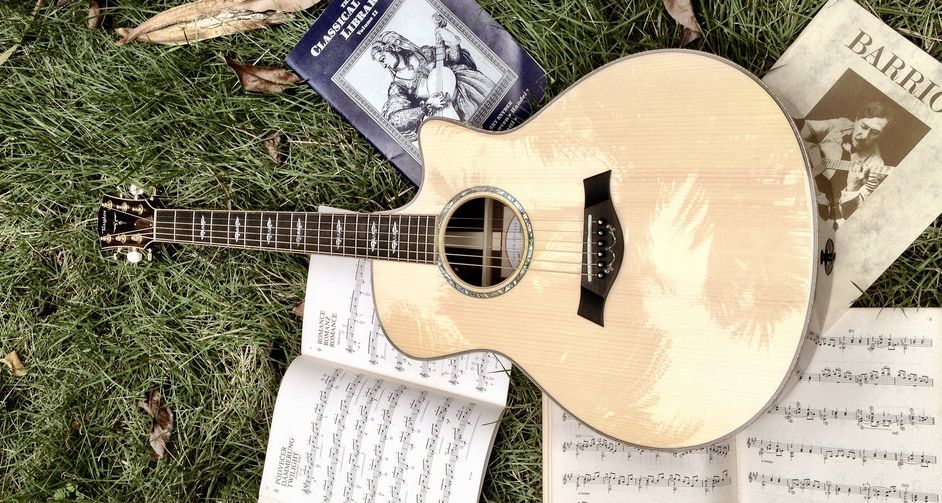If you have been following this blog since the start of the year, you will know that I have set myself the challenge of learning, practicing and recording at least one fairly complex fingerstyle song per month.
Not being a natural sight reader, and not having played guitar regularly for a couple of decades, this was a fairly daunting task for me.
I generally break down my learning the following way:
- At least two hours per day for a whole week just playing the song slowly from start to finish so that I can get the whole piece 'in my head'.
- At least one to two hours per day for the following week concentrating on problems areas (i.e. tricky changes or chordal progressions). I also try and work on dynamics and adding some 'feeling' to the song.
- A few days after that doing 'dummy runs' of the whole piece from start to finish under 'concert conditions' to test my recall and confidence.
At this point, I feel I am ready to record the piece.
The problem with this method though, is that a couple of months after recording the piece, I cannot seem to recall it at all. I have had the situation whereby I sit down with my guitar and say to myself I will play one of the earlier pieces, but then hit a blank. In my head, I can 'hear' the song, but I have no idea where my fingers have to go to even start the piece. It's like I have only ever heard the song on the radio and never played it myself.
This concerned me greatly, and I wondered if this is how people suffering from some form of dementia experience the early onset.
I set about examining my methodology. Perhaps this 'cram' technique was not good for long term recall? I mean, I can still remember songs I learned 20 years ago and play them off the cuff, but new ones just didn't seem to sink in. Perhaps my age (47) has something to do with this?
I decided to set about trying something different for the last few pieces I am learning. I really wanted to see if there was anything I could do to improve my recall and long term memory for these pieces.
1. Changing my practice time
I have always thought of myself as an 'evening person', and in fact do most of my best creative programming work (my day job) in the evenings. I used to practice in the evenings too, in between programming sessions, believing that this was my optimal time.
However, I have since swapped my practice sessions to the morning, when my brain is fairly fresh and I am finding that if anything, I am picking up new pieces faster than I did before. It has only been a couple of months, but I feel that the pieces I am learning now are being retained better than some earlier ones.
I think trying to play guitar in between computer programming sessions also didn't work well. I mean, it works great for just plain relaxing, but as far as focused learning, I don't think my brain switched between the two type of creative flows easily.
2. Getting plenty of sleep
This is related to (1) above for sure. Trying to learn something new at the end of the day when my brain was fatigued certainly didn't help me. Now, when I approach a new piece of music with a well rested body and mind, I find there is a clarity there which I have never experienced before.
3. Learning two pieces at once
I mentioned above that trying to cut computer code and learning a new song didn't work well together, but this month I have tried something different in that I am trying to learn TWO whole new songs, at the same time.
This means that I break up my 2 hour practice sessions to spend about 30 minutes on each song on a rotating basis.
At first I was concerned that I would just confuse myself and end up playing the wrong changes, but that hasn't happened. I find that I can slip into the whole 'mood' and feel of the song quite quickly and easily. It also helps to break the boredom when I get stuck on a particular bar. I just switch to the other song for a while and then come back and explore the problem area with fresh eyes.
Whilst I used to learn a song from the first bar to the last in sequential order, working on two songs together means that often I come back to the song in the middle or towards the end. This is helping my recall for later parts of the songs quite well.
4. Looking after my health
Another thing I have changed is my seating position when playing. Rather than using an office chair, I have been using a special chair designed for performing guitarist, which coerces my body into the correct posture.
I have also upped my water intake, which I have read helps to improve mental performance and memory.
5. Planning ahead & working smarter
I know constant practice is important to really learn and retain a piece of music, but it turns out that most of the pieces I chose to learn this year use some very unconventional tunings. It is quite tedious to change and maintain different tunings on a guitar, and you also risk damaging the instrument by constantly changing the tension on the neck (not to mention constantly breaking strings).
To this end, I tended to ignore some songs for a long period as I just couldn't be bothered switching tunings all the time. What I have done now is to actually purchase a new guitar and 'borrow' a guitar off my sons so that I now have up to 4 guitars which I can leave in different tunings and ready to go.
That way, when the inspiration seizes me to play an older song in open 'C' tuning, I know which guitar is always in that tuning now and can grab it and immediately play it without and distracting preamble.
It is still early days in my experiment. I hope to come back in a couple of months and reported that yes, the techniques that I have outlined here have helped to improve my retention.
Feel free to check out my progress on this blog and on my SoundCloud page.

